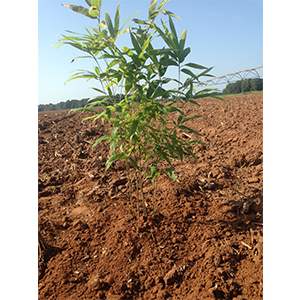[Seattle] New company Resource Fiber aims to run the first vertically integrated bamboo flooring company in the U.S., with plans to both harvest and manufacture bamboo in Alabama.
Resource Fiber’s founders, Ann and David Knight, retired from bamboo maker Teragren in 2011, and have since been on a mission to grow the first domestic bamboo harvest here in the states, and hopes to have their operation fully up and running within the next 20 years or so.
“Bamboo production is a $15 billion dollar industry and our goal is to obtain $1billion of that market. As of right now there is no bamboo manufacturing in the U.S.,” explained Ann Knight, chief communications officer and executive vice president, Resource Fiber. “We’re building the first U.S. bamboo industry and Alabama will be the epicenter.”
Resource Fiber planted the first 100 acres early in October in a region of Alabama known as the Black Belt, the former home to acres upon acres of cotton fields. While the cotton crops have since been replaced with crops of soft wood, Knight said the soft trees do not hold up to the type of weather known to that area.
“Bamboo, being much more flexible, better withstands severe weather. We planted the first 100 acres in early October, and we’ll graduate to another 4,000 acres within the coming years,” she said.
Since Resource Fiber plans to be a vertically integrated business, they will use local farmers and land owners to help grow the bamboo — the company will buy those crops back and use them to manufacture its own products, Knight explained.
“We’re not asking farmers to grow the crop and then tell them what do with it — we’re going with a vertical model so the farmers have an income when the crop’s ready to be harvested,” said Knight. “It’ll be about 10 years until the first set of crops are up and running.”
Prime real estate
Alabama is an ideal state to grow bamboo for a number of reasons, explained Knight. “We were contacted by the former first lady of Alabama after we moved on from Teragren. We were already invested in growing bamboo here in the States and the more we looked at Alabama, the more it made sense to grow our crops there. The soil and climate are ideal to grow timber (Moso) bamboo and bio-mass (rubro) bamboo, the two bamboo species we will be growing,” she said.
Having one of the highest unemployment rates, Alabama is also an ideal location because Resource Fiber aims to support job growth.
“We’ll apply our principles of best practices in hopes of creating a better economy and more jobs in the state. The made in U.S.A. trend is very big and we’re hoping that will help move our venture along, and it will have a beneficial impact on the state over the next 25 years. It won’t be a quick fix but we have to start somewhere,” said Knight.
Another benefit to harvesting bamboo here, said Knight, is related to cost. “Labor costs in China are rising, as well as transport and fuel prices, so really it’s a prime time to be doing this,” she said.
Currently, Resource Fiber is in the middle of making investments. “Our goal is use bio-mass bamboo to manufacture product such as biochar, a charcoal-like material used to increase agricultural productivity, which can be used on our farm and can be sold to the agricultural industry. Biochar can be combined with fertilizer and has a huge effect on climate change and capturing greenhouse gases. We’ll also be doing contract manufacturing for Teragren, as well as other companies, in addition to making our own products,” said Knight.
According to Knight, Resource Fibers’ plans for harvesting bamboo will be quite different from how Chinese manufacturers harvest bamboo.
“So many manufacturers in China harvest by hand. We’ll be creating our own proprietary equipment while maintaining the biodiversity of the land. We’re planting enough bamboo where it’ll cover around 100,000 acres over the next 20 years,” she said.
And, because bamboo is a rapidly renewable material, it doesn’t have to be re-harvested. “Moso bamboo takes about five to six years to mature and bio-mass bamboo is about a three year harvest. In the meantime, while we wait for our planted crops to grow, we will be importing raw material product from South America and China that we can start manufacturing now so we have cash flow while waiting for our bamboo to mature. We’ll transition away from that once we have our own supply,” Knight said.
— Mallory Cruise

The first rubromarginata (rubro) bamboo plant was planted in Resource Fiber’s initial in-field 100-acre nursery land.